US Lawmakers Warn Against Iran Boosting Oil Revenues Despite Sanctions
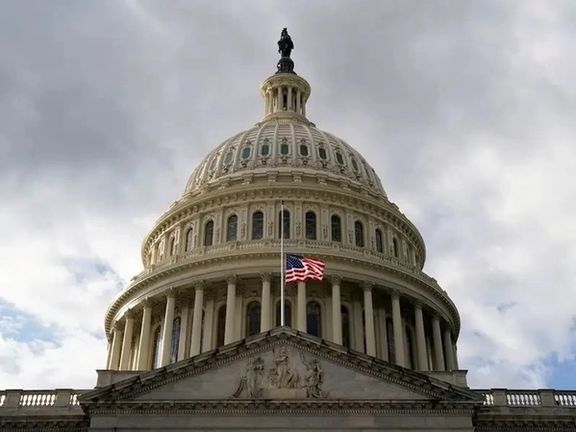
In a letter to the US Treasury Department, 11 members of the House of Representatives warned against Iran’s illicit strategies to circumvent oil sanctions.

In a letter to the US Treasury Department, 11 members of the House of Representatives warned against Iran’s illicit strategies to circumvent oil sanctions.
Iran’s actions are “compromising the safety and integrity of the international maritime industry and threatening our national security interests,” read the bipartisan letter.
Iran-backed Houthis have been attacking shipping in the Red Sea since mid-November, endangering lives and international commerce.
The representatives added that the Islamic Republic is on the verge of reaching its pre-sanctions revenues with selling 1.5 barrels per day, a number which is unprecedented over the past five years.
Buying 1.05 barrels per day, China is still the main customer of Iranian oil, the letter went on to say.
The representatives cited United Against Nuclear Iran’s recent warning that 370 foreign-flagged “ghost ships” are suspected of contributing to Tehran’s circumvention of oil bans over the past two years.
“This number is a 300-unit increase from its previous finding in November 2020,” said the letter.
The representatives also called for sanctions against the ghost ships involved in Iran’s illicit oil transfer.
Mohsen Khojasteh-Mehr, the CEO of the National Iranian Oil Company announced on Tuesday a 60% growth in the country's oil production over the past two years in spite of global sanctions.
According to a Congressional hearing earlier in the month, Iran has quadrupled its oil revenues since President Joe Biden took office, helping the regime better fund its malign activities.
“The Biden administration has taken a consistently weak approach to enforcing the energy sanctions that would have the strongest economic impact on Russia, Iran and Venezuela,” said Rep. Blaine Lutkemeyer, chairing the hearing.
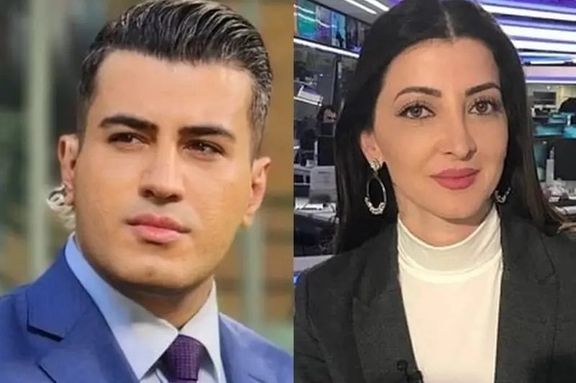
The IRGC was plotting to assassinate two Iran International television anchors in London in 2022 amid Iranian anti-government protests, UK’s ITV has revealed.
The plan was foiled because the man hired to do the job turned out to be a ‘double-agent’ working for a western intelligence agency. He would relay all information to his handler and has now shared some details with ITV.
Based on irrefutable evidence –seen and verified by ITV and multiple officials– the plot was commissioned and signed off by Mohammad Reza Ansari, the IRGC commander in charge of assassinations outside Iran.
Ansari is the ‘mastermind’ behind failed plots to assassinate former US officials Mike Pompeo and John Bolton –for which he’s been sanctioned by the US treasury. He is based in Syria and is reported to have links with the family of the Syrian dictator Bashar al-Assad.
According to ITV, Ansari hired and directed the hitman (Ismail) through another Assad associate, Mohammad Abd al-Razek Kanafani, requiring him first to use a car bomb and then a ‘quiet’ way to kill his targets: “simply stab [them] with a kitchen knife.”
The plot was cynically codenamed the “wedding”. The targets, Sima Sabet and Fardad Farahzad, were “bride” and “groom”. They did not know about the details of the plot until told by ITV during the making of the report.
Ismail, a people-smuggler turned IRGC operative and then double-agent, was promised $200,000, a new identity and safe passage to Iran via Syria.
This seems to have become the IRGC’s preferred method recently, using criminals rather than sympathizers or members of affiliated, non-Iranian militant groups, as was the case years back.
In November 2022, Volant Media, the parent company of Iran International, said that two of its journalists had been notified of direct threats. It said in a statement the Metropolitan Police had formally notified both journalists that these threats represented an imminent, credible and significant risk to their lives and those of their families. Following the significant escalation in Iranian state-backed threats and advice from the London Metropolitan Police, Iran International TV announced in February that it reluctantly and temporarily closed its London studios and moved broadcasting to Washington DC. After months of hiatus in broadcasting from the UK, the network relaunched operations from a new London building in September.
Since its inception, the Islamic Republic of Iran, has been engaged in such plots against Iranian opposition in exile. Some attempts have been more successful than the others, but the regime has never ceased threatening and targeting those who dare speak against it, even those ostensibly safe in western Europe or the United States.
Many Iranian activists believe that the failure of the host states to exact a high price for such atrocities have contributed to its continuation. Those arrested, even found guilty, have often been handed back to Iran in ‘exchanges’ –that, in turn, have been made possible through hostage-taking.
The most recent example is the release of Asadollah Assadi, a former attaché at the Iranian embassy in Austria, who was convicted in Belgium for plotting to bomb a gathering of Iranian opposition in France in 2018. He went back to Iran triumphantly in a deal to bring back Belgian aid worker Olivier Vandecasteele who was taken hostage in Iran in 2022 and sentenced to 40 years in prison.
According to ITV, the hitman (Ismail) was told the two presenters had to be targeted because they were causing the Iranian regime “a lot of humiliation in the media.”
“They accuse Iran of committing any kidnap or assassination [on television] and we must finish them and make an example of them… so anyone who will take their place in the channel will learn a lesson from what happened to them,” Iranian spies told Isamil.
The Iranian regime has been attacking Iran International ever since its launch in May 2017. It’s been called a “terrorist organization” and is deemed a “public enemy.”
In September 2023, Iran’s Intelligence Minister appeared on state television to reiterate that the regime would not refrain from “invasive security measures” against Iran International to show that “no terrorist media will be safe.”
“We believe that Iran International is a terrorist network, and naturally we deem it our duty and mission to act against them wherever and whenever we deem appropriate,” he said.
The ITV report Wednesday was broadcast only a few hours after the jury of a UK court returned a guilty verdict for a suspect gathering information on Iran International's London headquarters for a possible terror attack.
Chechnya-born Magomed-Husejn Dovtaev was detained by officers from London’s Metropolitan Police Counter-Terrorism Command in February 2023. He was charged with attempting to collect information "likely to be useful to a person committing or preparing an act of terrorism."
The final verdict will be issued by the court on Friday.
“This trial was a reminder of the threats journalists and news organizations face,” Iran International said in a statement after the verdict was announced. “We will not be cowed by threats. Our journalists will continue to provide the independent, uncensored news the people of Iran deserve,”
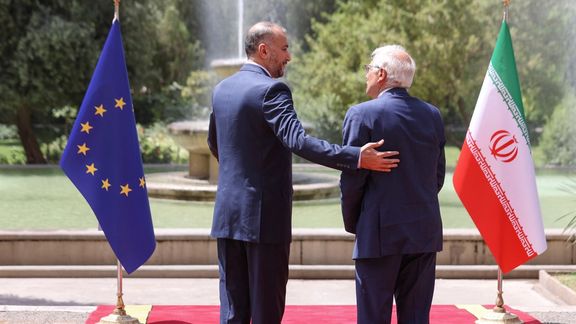
A German paper reported on Monday that a classified EU document states that IRGC can be sanctioned as a terrorist organization in Europe, despite assertions to the contrary by some politicians.
German lawmaker Norbert Röttgen has accused his country’s foreign minister, Annalena Baerbock, of lying to the international community that the IRGC cannot be outlawed in Europe.
In a significant escalation of the sparring between Röttgen and the Green party controlled foreign ministry, the Christian Democratic party MP took to X on Monday to announce: “Baerbock has been deceiving the public for almost a year and is deliberately telling a untruth in the Bundestag regarding the expert opinion report on the terrorist listing of the Revolutionary Guards. This in no way says that listing is currently not possible.”
Baerbock, who claims to have a “feminist foreign policy,” has mirrored the comments of EU foreign policy chief Josep Borrell for nearly a year that "as of now, we don't have legal grounds in the EU to list the Revolutionary Guards as a terrorist organization."
Baerbock, whose Green party has faced criticism over the years for embracing an appeasement policy toward the clerical regime in Tehran, argued that an expert opinion of the European Council lawyers prevented the IRGC from being sanctioned.

Röttgen linked in X post to an article in the left-wing German paper Die Tageszeitung (known in Germany as taz) that reported it obtained a classified EU expert opinion that established Baerbock lied to the international community.
According to die taz, the EU expert opinion states the legal service of the European Council determined that legal decisions outside the EU determining that the IRGC engaged in acts of terror could be used as a basis for banning it. “If the Council relies on a decision of a third country, it must ensure that this decision was taken in compliance with the rights of the defense and the right to effective legal protection,” the opinion reads.
Borrell appeared to have also misled the international community in January, when he claimed that an EU legal decision is necessary to designate the IRGC as a terrorist entity. Röttgen and counter-terrorism experts such as Matthew Levitt have mounted significant evidence to show that Borell and Baerbock are not on solid ground with their arguments against a ban of the IRGC.
The German paper asked a number of legal experts for their assessment of the classified EU expert opinion. “The positions of the legal service do not provide a convincing justification against the terrorist listing. The impression is that the federal government is hiding behind weak legal arguments,” said Matthias Herdegen from the University of Bonn.
The EU’s classified legal opinion presented legal verdicts from the US in 2020 and 2018 that showed the IRGC was responsible for blowing up the Khobar Towers in Saudi Arabia in 1996. However, the EU said the cases from Khobar are not current enough to form the basis for a ban of the IRGC.
Christian Marxsen, Professor of Public Law and International Law at the Humboldt University in Berlin, told die taz, “The report discusses the legal requirements for listing as a terrorist organization…there is no statement in the report as to whether there are other points of reference – for example further court or administrative decisions from other countries – for such a listing.”
Iran International reported in late November that a German court convicted a Pakistani man in 2017 who was paid by the IRGC to engage in an assassination attempt of pro-Israel advocates.
The Quds Force—a part of the IRGC—paid Pakistani Syed Mustaf at least 2,052 euros from July 2015 to 2016 to spy on Jewish and Israeli institutions and carry out the assassination plot. The case of Mustaf could be used by the EU to outlaw the IRGC, according to experts.
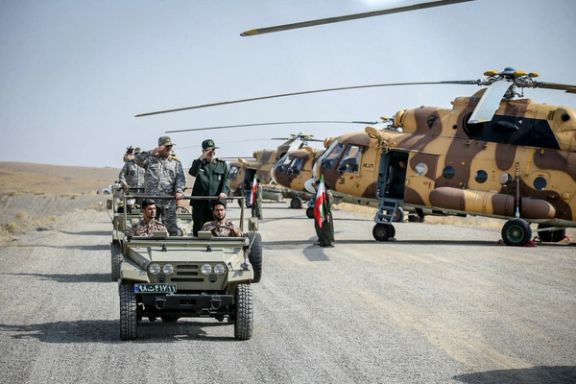
The taz reported that “There are numerous voices in and around the Foreign Office who reject the Revolutionary Guard's terrorist listing.” One voice is Guido Steinberg who is a Senior Associate at the Middle East and Africa Research Division of the German Institute for International and Security Affairs (SWP).
Steinberg told the German magazine Stern in July that he is against the listing of the IRGC as a terrorist organization because the IRGC is a normal military force. This is an argument that Tehran often uses despite the fact that the IRGC has a large intelligence organization engaged in domestic repression and also has its own espionage network abroad.
The US government classified the IRGC a terrorist entity in 2019.
The German Institute for International and Security advises the German foreign ministry and has been embroiled in pro-Hamas and antisemitism scandals this year. In July, Israel’s embassy in Berlin slammed the institute’s researcher Muriel Asseburg for suggesting in an interview with a hardcore anti-Israel activist that terrorism attacks against Israelis can be dismissed as not significant and there should be support for Palestinians' right to "violent resistance" against the "Israeli occupation.”
The German Institute for International and Security has been plagued by its efforts to promote a partnership with Iran’s regime. In 2008, a Wall Street Journal opinion article stated Volker Perthes, the former director of the controversial institute has “been lobbying for more than two years for a ‘strategic partnership’ with a Holocaust-denying regime that sponsors international terror and suppresses its own people.”
Press queries sent to Baerbock’s spokesman Sebastian Fischer and spokeswoman, Tittel, as well as to German interior minister spokesman Björn Bowinkelmann ,were not returned. Iran International phone calls to both ministries were not answered.

The jury of a UK court has returned a guilty verdict for a suspect gathering information on Iran International's London headquarters for a possible terror attack.
Originally from Chechnya but residing in Austria, Magomed-Husejn Dovtaev (Mohammad-Hussein Dovtaev) was detained at Chiswick Business Park by officers from London’s Metropolitan Police Counter-Terrorism Command in February. He was charged with a single count of attempting to collect information "likely to be useful to a person committing or preparing an act of terrorism." The final verdict will be issued by the court on Friday.
During the course of the trial, the police also released footage of Dovtaev gathering information about the security arrangements around the office building that housed Iran International and recording videos of the area. The police also released footage of the moment he was arrested.
Prosecutors said Dovtaev covertly filmed material on his phone in order to "identify vulnerabilities" in the media company's security which could be exploited by others.
“This trial was a reminder of the threats journalists and news organizations face. Journalism is under attack across the world from those who seek to suppress media freedom,” Iran International said in a statement after the verdict was announced.
“We will not be cowed by threats. Our journalists will continue to provide the independent, uncensored news the people of Iran deserve,” stated the news and television network, which is the the most viewed foreign-based channel in Iran in the absence of free media in the country.
Expressing gratefulness to the Metropolitan Police for all their efforts to ensure the safety of Iran International journalists, the channel said, “Today's verdict sends a clear message that the UK remains a bastion of free speech where threats against journalists will not be tolerated.”
Prosecutor Nicholas de la Poer told London's Old Bailey on Monday that Iran International became a target for reprisals following its reporting on the death in custody of Mahsa Amini in Iran last year and subsequent protests in the country. Iran's minister of intelligence later declared Iran International a terrorist organization, de la Poer said, which meant its employees "became targets for violent reprisals".
In November 2022, Volant Media, the parent company of Iran International, said that two of its journalists had been notified of direct threats. It said in a statement the Metropolitan Police had formally notified both journalists that these threats represented an imminent, credible and significant risk to their lives and those of their families. Following the significant escalation in Iranian state-backed threats and advice from the London Metropolitan Police, Iran International TV announced in February that it reluctantly and temporarily closed its London studios and moved broadcasting to Washington DC. After months of hiatus in broadcasting from the UK, the network relaunched operations from a new London building in September.
Faced with nationwide antigovernment protests since mid-September, the Islamic Republic has blamed foreign-based Persian broadcasters such as the BBC Persian and Iran International of “fomenting unrest”, while all media in the country are under tight government control and present protesters as “rioters” and “terrorists”. According to Iran’s Intelligence Minister Esmail Khatib, the Islamic Republic regards Iran International as “a terrorist organization.” He has stated that its staff and anyone affiliated with the channel will be pursued by the Ministry of Intelligence all over the globe, reiterating threats to “punish all those” who had a role in popular protests against the regime, wherever they might be.
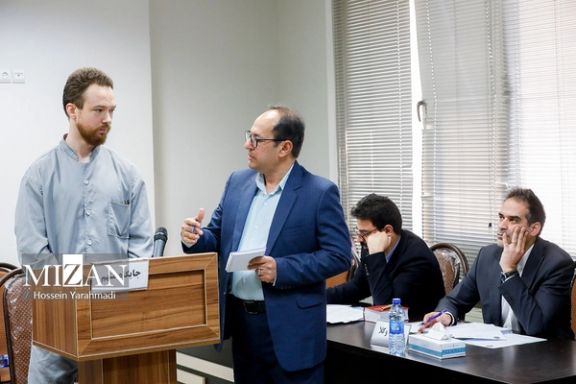
One day after a Swedish court upheld the conviction of a former Iranian jailer for killing prisoners, a Tehran court leveled serious accusations against a Swedish man.
Johan Floderus, detained in April 2022 during a vacation in Iran on charges of espionage, is now navigating a legal process marked by little transparency and what appears to be a hostage situation. He has been in detention for more than 600 days.
Iranian officials vehemently slammed a Swedish appeals court for upholding a life sentence for Hamid Nouri, a former prison official who was convicted earlier this year for his role in the massacre of up to 5,000 political prisoners in 1988. The Swedish verdict upholding the sentence was announced on Wednesday, as Tehran used pressures and threats to influence the appeal decision.
Now, Floderus is accused of “corruption on earth”, a serious Sharia charge that can lead even to a death sentence. This particular charge is often used by the Iranian regime against pollical opponents. He is accused of espionage, but the case, as many other similar detentions of foreigners in Iran, is wrapped in a lack of transparency.
He was told in the court on Wednesday that "These accusations are based on intelligence surveillance by Iranian security forces, scrutiny of messages, emails, monitoring of your mobile phone, your travels to various countries, your presence in Iran's border cities, your communications, trips to occupied territories [Israel], and other pieces of evidence."
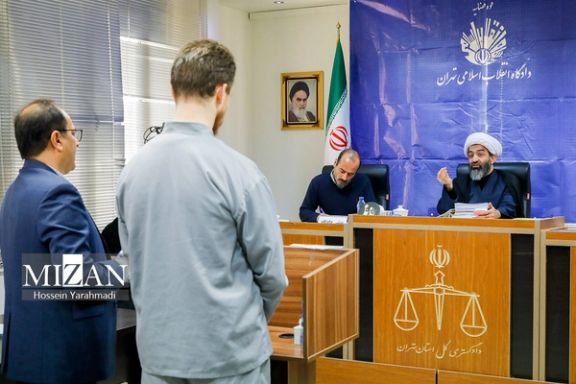
According to Iranian media, Floderus did not accept the allegations attributed to himself and emphasized: “The issued warrant has a general and abstract nature and has no direct connection with me."
Judge Iman Afshari also accused Floderus of having connections with Swedish military institutions, but this EU diplomat emphasized that after completing his 13-month military service, he had no ties to Swedish military, intelligence, or security institutions."
Iran’s foreign ministry and Judicial authorities have categorically rejected the Swedish appeal court’s decision regarding Hamid Nouri. Naser Kanaani, the foreign ministry spokesperson responded to the confirmation of the life imprisonment sentence for Nouri, saying, "Iran fundamentally finds the verdicts of the lower and appellate courts regarding Hamid Nouri unacceptable and strongly condemns them."
Kazem Gharibabadi, the Secretary of the Human Rights Headquarters of Iran’s Judiciary, threatened that “Sweden's actions in this regard will not be without cost.” He made a bizarre statement that “In this case, the English were also involved, and it was not a case solely decided by Sweden."
The Floderus case is similar to the conviction of Assadollah Assadi, an Iranian diplomat convicted for terrorism in Belgium but released in May after Iran detained a Belgian traveller and accused him of espionage. Aid worker Olivier Vandecasteele spent 455 days in Iranian detention facing an uncertain future until Belgium gave in and released the convicted Iranian official.
At the time, many warned that such a prisoner exchange would set a dangerous precedent for other Westerners. The Islamic Republic of Iran has a history of detaining foreigners and dual national to use the as bargaining leverage against Western countries.
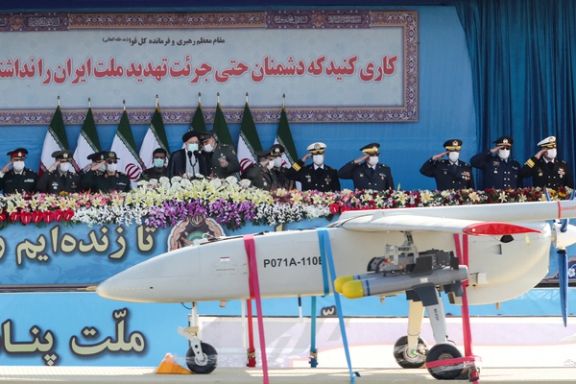
Amid Houthi attacks in the Red Sea, the US announced new sanctions Tuesday, targeting ten entities and four individuals for their role in advancing Iran’s drone program.
Through a complex network of intermediary and front companies, those sanctioned would purchase drone components from the US (or other foreign countries) and deliver to the IRGC for its Unmanned Aerial Vehicle (UAV) program.
"We remain focused on disrupting the efforts of Iran and its agents to circumvent US sanctions in support of Iran's weapons programs, including its drone program, which have been used to support and supply terrorist organizations and other foreign adversaries –such as Russia– around the globe,” the United States Attorney Matthew Graves said in a statement.
In recent years, drones have become a major element of Iran’s military and strategic approach, put to use mainly by the regime’s allies and proxies.
Iran-made drones have been used widely –and fatally–by Russia in Ukraine. Russia has fired hundreds of Iranian kamikaze drones at Ukraine's civilian targets. Militant groups in Syria and Iraq have deployed them against US bases. And Yemen Houthis are using them to attack commercial vessels in the Red Sea.
Since the beginning of the Israeli onslaught on Gaza, Iran has published videos that it claims show its drones “looking over” US warships in the region, boasting about its capabilities.
"Iran is taking advantage of what is a very very difficult situation right now. It's not surprising," US Senator Michael Bennet told Iran International's Arash Aalaei on the Iran-backed Houthi attacks in the Red Sea, warning that there will be "serious" economic consequences "if the shipping lanes are shut down".
Existing sanctions prohibit export of dual-use or sensitive technology to Iran. And that is exactly what the sanctioned individuals are accused of doing.
Hossein Hatefi Ardakani and Gary Lam (also known as Lin Jinghe) are accused of conspiring to illegally purchase and export US-made dual-use microelectronics to Iran.
"Ardakani and his co-conspirators crafted a sophisticated web of front companies to obscure the illicit acquisition of US and foreign technology to procure components for deadly UAVs," special agent Michael Krol said. "These very components have been found in use by Iran's allies in current conflicts, including in Ukraine."
The targeted individuals and entities are based in Iran, Malaysia, Hong Kong and Indonesia, according to the US Treasury Department. They would use foreign companies to evade US controls, and in this way, managed to procure “hundreds of thousands of dollars” worth of drone components for the IRGC.
"Iran's illicit production and proliferation of its deadly UAVs… continues to exacerbate tensions and prolong conflicts, undermining stability,” Undersecretary for Terrorism and Financial Intelligence Brian Nelson said in a statement.
Some Republican lawmakers have blamed President Biden for the current crisis in the Middle East, saying that he has chosen to look away when it comes to enforcing sanctions on Iran –in effect, rewarding the regime with tens of billions of dollars more in oil revenue that helps fund a range of malign activities in the region.
“We must continue to respond to any attempt by Iran to avoid sanctions,” Congressman Colin Allread said Tuesday, “that's why I lead a bipartisan effort urging the Treasury to expand its work to prevent Iran from using illicit and deceptive shipping practices to evade US sanctions on oil exports.”